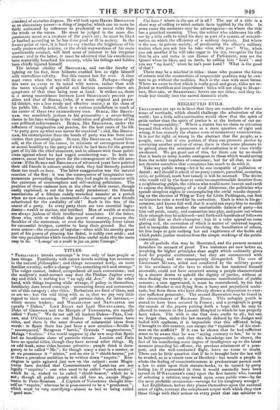NEGLECTED EVILS.
ENGLISHMEN are apt to believe that they are remarkable for a nice sense of rectitude, which should challenge the admiration of the world ; but a little self-examination would show that the spirit of pride rather than the spirit of justice is at the bottom of our national "respectability." Where a matter has no claim to attention beyond that which it possesses as a mere question of right and wrong, it has scarcely the chance even of momentary consideration. It is not for right or wrong in the abstract that the people, as a people, care ; but if one portion of them can promote justice by convicting another portion of error, there is then some pleasure to be gained, since the sentiment of self-exaltation is at once vividly awakened. We get good out of this, for there can be no doubt that it leads to many results analogous to those which would spring from the nobler impulses of conscience; but for all that, we must not deceive ourselves that conscience has much to do with it.
Take any public wrong—let it be one incapable of palliation or denial ; and should it admit of no party contest, parochial, sectarian, civic, or political, mark how tamely it will be scanned. The divine who would rail by the hour at some incomprehensible doctrine from a neighbouring pulpit, the citizen who would move heaven and earth to expose the delinquency of a rival Alderman, the politician who spends sleepless nights in contemplating the awful results depending on the election of Whig or Tory for Little Pedlington, can find no leisure to raise a word for its correction. Each is wise in his generation, and knows full well that it would not repay him to meddle with it. Let him awaken the uncharitable diemon of party—let him call pride, vanity, and contention into play, and point out where their triumph may be achieved—and forthwith hundreds of followers will exalt him as their champion : but in a calm appeal on some glaring evil, the correction of which is matter of universal import, and is incapable therefore of involving the humiliation of others, let him hope to gain nothing but sad experience of the feeble aid which public justice receives from the simple workings of the public conscience.
At all periods this may be illustrated, and the present moment furnishes its amount of proof. Two instances are now before us, involving far higher principles than aught which ordinarily gives food for popular excitement ; but they are unconnected with party feeling, and are consequently disregarded. The case of Lieutenant Miami aided and comforted by the military power in his avoidance Of the laws to which he has rendered himself amenable, could not have occurred among a people characterized by a sincere desire to uphold the dignity of justice, without at once finding its remedy in a spontaneous manifestation of public censure; a case aggravated, it must be remembered, by the fact that the offender is not flying from a hasty and prejudiced multitude, but from those who have already shown a disposition to exercise sufficient generosity. The second illustration may be found in the circumstances of RICHARD DADD. This unhappy youth is stated to have been secured in France; • and a paragraph is going the rounds of the papers putting forth a hope that he may be allowed to remain in the Lunatic Hospital to which he has properly been taken. The wish is one that does credit to all; but can we forget that, under the law recently defined by the Judges and bailed with applause, it is impossible that this afflicted being, if brought to this country, can escape the "expiation" of his madness on the scaffold ? If it can be shown that he had sufficient sense to be aware that he was "acting contrary to law," he is to be held responsible ; and that this knowledge can be shown the fact of his manifesting some degree of intelligence up to the latest moment preceding his offence the previous attainment of a passport, and the well-conducted flight, leave no room to doubt. There can be little question that if he is brought here the law will be evaded, as in a recent case at Hertford : but would a people in whotn the feeling of conscientiousness is predominant permit such a law to exist upon their statute-books, to be turned by party feeling (as if expounded in time it would assuredly have been turned in AVNAUGHTEN'S case) upon the first lunatic who, instead of selecting a relative, may wreak upon some public man—by far the most probable occurrence—revenge for his imaginary wrongs? Let Englishmen, before they plume themselves upon the national sense of right, contrast the complacent torpor with which they view these things with their ardour on every point that can minister to
a personal triumph. HMV votes at the approaching City election were dependent upon the surrender of Lieutenant Muinto, or upon the amendment of the law as to criminal lunatics, the Home Secretary would soon find it necessary to purchase relief from clamour by pledging himself to perform all that justice could demand.



























 Previous page
Previous page